

CAS Primary Course... Kerpoof Studio. National curriculum in England: computing programmes of study. Purpose of study A high-quality computing education equips pupils to use computational thinking and creativity to understand and change the world.
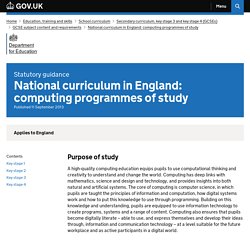
Computing has deep links with mathematics, science and design and technology, and provides insights into both natural and artificial systems. The core of computing is computer science, in which pupils are taught the principles of information and computation, how digital systems work and how to put this knowledge to use through programming. Computing ITT & CPD. This site has been put together by a small group of teachers and teacher educators convened by the DfE's Teaching Agency and chaired by Bob Harrison.
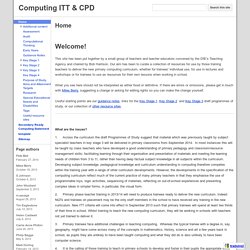
Our aim has been to curate a collection of resources for use by those training teachers to deliver the new primary computing curriculum, whether for trainees' individual use, for use in lectures and workshops or for trainees to use as resources for their own lessons when working in school. What are the issues? 1. Mputing - TeCoEd (Teaching, Computing and Education) A selection of plans, guides and examples to help improve ICT teaching. Ian Addison's Blog » Projects. I am currently involved in a number of projects and initiatives within my school and beyond.
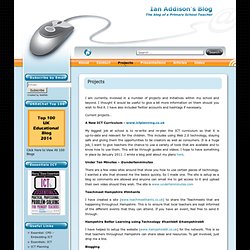
I thought it would be useful to give a bit more information on them should you wish to find it. I have also included Twitter accounts and hashtags if necessary. Computer Science for Fun - cs4fn: HOME. Consultation on reform of the National Curriculum in England - About the Department. Taking the bull by the horns: The proposed computing curriculum. We were very fortunate at Roydon Primary to have a forward-thinking head who embraced ICT innovations.
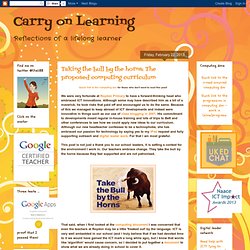
Although some may have described him as a bit of a maverick, he took risks that paid off and encouraged us to do the same. Because of this we managed to keep abreast of ICT developments and indeed were innovative in things such as our use of class blogging in 2007. His commitment to developments meant regular in-house training and lots of trips to Bett and other conferences to see how we could apply new ideas to our curriculum.Although our new headteacher confesses to be a technophobe, she has embraced our passion for technology by saying yes to my iPad request and fully supporting outreach and digital leader work.
For that I am most grateful.This post is not just a thank you to our school leaders, it is setting a context for the environment I work in. Our teachers embrace change. You can read about some of my favourite free ICT resources in previous posts. Computer Science Unplugged. Computing ks1-ks4. Computing For the Next Generation ... Computing - A Curriculum for Schools. Download This curriculum, produced by a working party within CAS, describes in concrete terms what a Computing curriculum at school might look like.
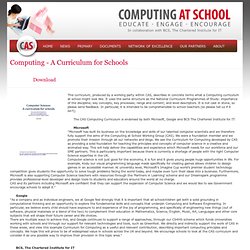
It uses the same structure as the National Curriculum Programmes of Study: importance of the discipline; key concepts; key processes; range and content; and level descriptors. It is not cast in stone, so please send feedback. In particular, it is intended to be comprehensible to school teachers (so please tell us if it isn’t). The CAS Computing Curriculum is endorsed by both Microsoft, Google and BCS The Chartered Institute for IT: Microsoft "Microsoft has built its business on the knowledge and skills of our talented computer scientists and we therefore fully support the aims of the Computing at School Working Group (CAS).
BCS, The Chartered Institute for IT "BCS, The Chartered Institute for IT, is the professional body for IT in the UK. Developing the ICT curriculum. Creating a new ICT curriculum. Back in 1999 computers were very different beasts.
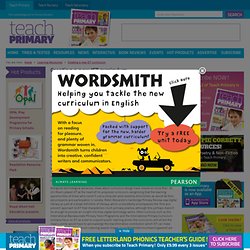
Many of us were using Windows 98 or ME; software would have been installed from CD-ROM, but we’d have still been using 3.5-inch floppy disks to transport our documents – assuming they fitted inside the 1.44 MB capacity, that is. The school I was working at back then had made the leap onto the information superhighway, with 128K ISDN, but our home Internet was still relying on dial-up. Moore’s Law, that computing power doubles every couple of years or so, has brought some amazing advances since then – so much so that the above description seems quaintly nostalgic.
It’s perhaps something of a surprise that the current National Curriculum for primary ICT dates back to the same time; but what is more surprising is that the statutory part of the Curriculum has stood the test of time remarkably well. Alongside technological advances, ideas about curriculum design have moved on since then.
EYFS. Hampshire IT Curriculum - Home. A selection of plans, guides and examples to help improve ICT teaching. KS1 and KS2. Primary ICT Curriculum Improvement. The Naace Curriculum - An ICT Framework. The Naace curriculum area is the place to find all the latest updates to the Naace Curriculum Framework.
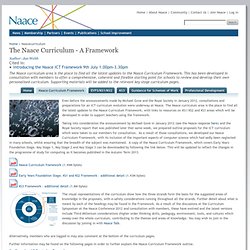
This has been developed in consultation with members to offer a comprehensive, coherent and flexible starting point for schools to review and develop their own personalised curriculum. Supporting materials will be added to the relevant key stage curriculum pages. Even before the announcements made by Michael Gove and the Royal Society in January 2012, consultations and preparations for an ICT curriculum evolution were underway at Naace.
Somerset eLIM Ed Tech - Home.